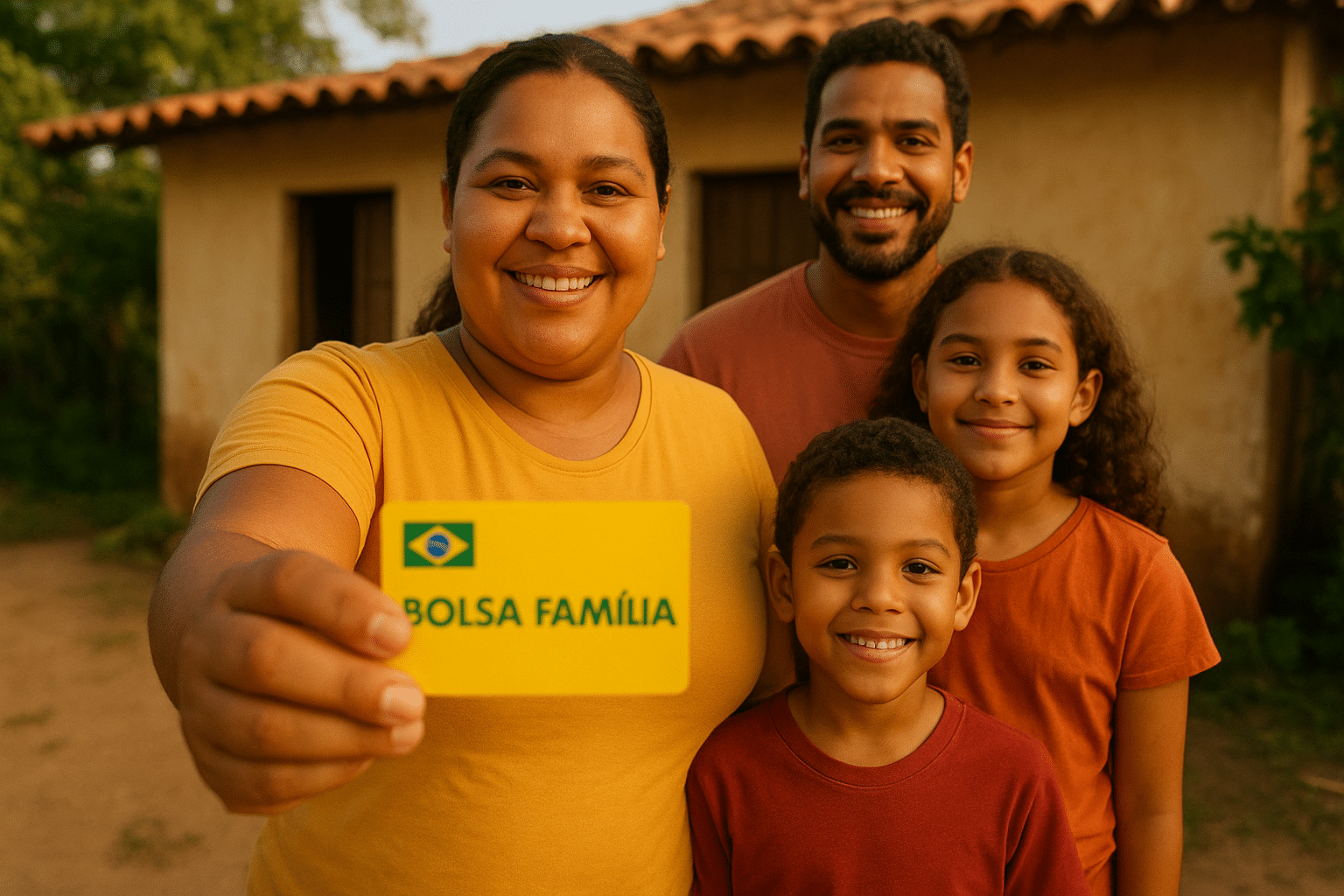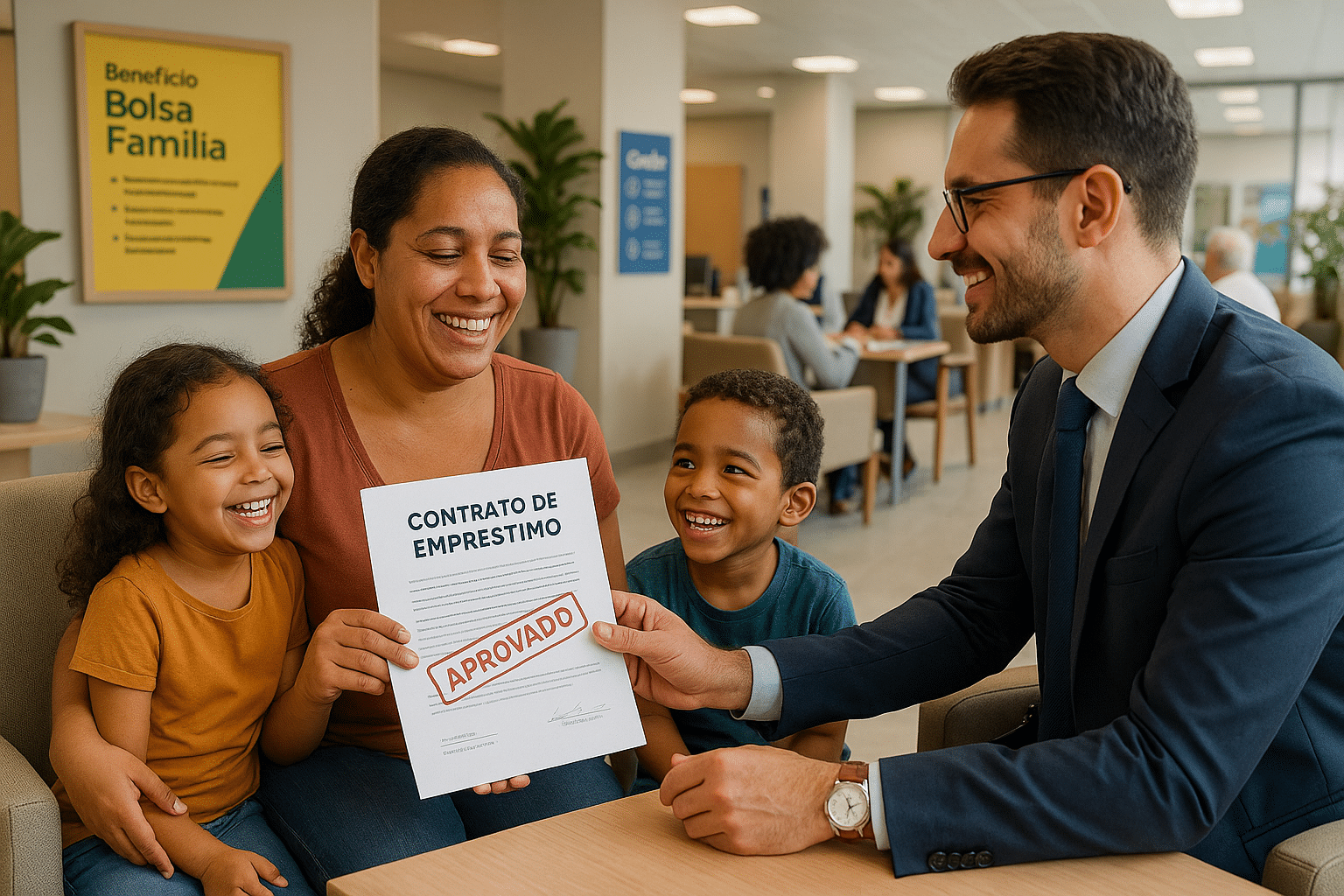Anúncios
In Brazil, financial freedom remains a distant dream for many families relying on government assistance. However, new opportunities are emerging to help Bolsa Familia recipients take a step closer to achieving stability and growth. One such opportunity is through targeted loan programs designed to empower low-income households. 💡
This post dives deep into the possibilities and challenges of loans for Bolsa Familia recipients. We’ll explore how these financial solutions work, who qualifies, and the potential impact on families striving for a better future. By providing access to credit, these programs aim to unlock paths to entrepreneurship, education, and improved living standards. 📈
Anúncios
Could this be the key to breaking the cycle of poverty for millions? Stay with us as we break down everything you need to know about this growing initiative in Brazil and how it could reshape financial prospects for countless families. 🌟
The Expansion of Financial Access Through Loans for Bolsa Família Beneficiaries
Understanding the Role of Bolsa Família in Brazilian Society
The Bolsa Família program, launched in 2003, has been a cornerstone of Brazil’s social assistance framework. Designed to provide financial aid to families in extreme poverty, this initiative aims to reduce inequality and ensure access to education and healthcare for the country’s most vulnerable populations. The program’s reach is extensive, benefiting millions of families across the nation.
Anúncios

Unlock Your Bolsa Família Benefits
For many recipients, Bolsa Família provides the only consistent income they can rely on. However, the program alone may not always suffice to meet all household needs or allow families to plan for the future. This is where the introduction of loans tailored for Bolsa Família recipients comes into play, offering opportunities to unlock financial freedom.
Why Loans for Bolsa Família Recipients Matter
Providing access to credit for low-income families has significant social and economic implications. Loans allow beneficiaries to:
- Invest in small businesses or entrepreneurial ventures 🛠️
- Cover emergency expenses without disrupting their daily lives
- Access better housing or make necessary repairs
- Improve educational opportunities for children
These loans are designed to be affordable and accessible, often with low-interest rates and flexible repayment options. By enabling families to access credit, the government and financial institutions aim to empower individuals to take charge of their economic future while fostering long-term self-sufficiency.
How the Loan Process Works
Eligibility Criteria and Application Process
To qualify for a loan under this scheme, applicants must be registered Bolsa Família recipients. The financial institutions offering these loans typically verify the applicant’s inclusion in the program through the Cadastro Único (Single Registry), which is the primary database for social assistance programs in Brazil.
Here’s a simplified step-by-step guide to the process:
- Step 1: Verify eligibility through Cadastro Único.
- Step 2: Submit a loan application to a participating financial institution.
- Step 3: Provide necessary documentation, such as proof of address, identification, and income.
- Step 4: Await approval, which usually considers the applicant’s ability to repay within their financial limits.
Many banks and microfinance institutions are partnering with the government to offer these loans, making the process more streamlined and accessible. Some even provide digital platforms for online applications, reducing the need for in-person visits.
Loan Amounts and Repayment Terms
The loan amounts available under this initiative vary depending on the financial institution and the applicant’s specific circumstances. Generally, these loans are small to moderate in size, designed to cater to essential needs and minor investments. Typical loan amounts range from R$500 to R$5,000.
Repayment terms are structured to minimize the financial burden on the borrower. These terms often include:
- Monthly installments tailored to fit the family’s income
- Low-interest rates, typically below market standards
- Flexible repayment periods, ranging from 6 months to 2 years
Such conditions are crucial for ensuring that the loans remain a tool for empowerment rather than becoming a source of financial stress.
The Economic Impact of Loans for Low-Income Families
Stimulating Local Economies
When Bolsa Família recipients gain access to loans, the benefits often extend beyond individual households. By investing in local businesses or spending in their communities, these families contribute to economic growth at the grassroots level. This creates a ripple effect, generating income for other small businesses and fueling local development.
For example, a family that uses a loan to start a small food stand not only improves their own income but also creates demand for locally sourced ingredients, benefiting suppliers and farmers in the area. Such interactions foster a more vibrant and self-reliant local economy.
Reducing Dependency on Social Programs
Another significant impact of these loans is their potential to reduce long-term dependency on social assistance programs. By enabling families to create sustainable income streams, these initiatives empower recipients to transition out of poverty and achieve greater financial independence.
Moreover, this shift not only benefits individual households but also alleviates the financial burden on the government, freeing up resources to invest in other critical areas such as healthcare and education.
Challenges and Risks in Offering Loans to Vulnerable Populations
The Risk of Over-Indebtedness
While loans can be a powerful tool for economic empowerment, they also come with risks, particularly for low-income families with limited financial literacy. One of the primary concerns is the risk of over-indebtedness, where borrowers take on more debt than they can manage to repay. This can lead to a cycle of financial instability, undermining the very goals these loans aim to achieve.
To mitigate this risk, many programs include financial education components. These initiatives teach borrowers how to budget effectively, manage their repayments, and make informed financial decisions. Such measures are critical for ensuring the long-term success of the program.
Operational Challenges for Financial Institutions
For banks and other lenders, offering loans to Bolsa Família recipients can be logistically challenging. Factors such as:
- High administrative costs for small-value loans
- Limited credit history of applicants
- Geographic barriers in reaching rural or remote populations
These challenges require innovative solutions, such as leveraging technology to reduce costs and improve accessibility. Mobile banking apps, for example, can play a crucial role in bridging the gap between financial institutions and low-income families.
The Future of Financial Inclusion for Bolsa Família Beneficiaries
Expanding Access Through Digital Solutions
The advent of digital banking has opened up new possibilities for enhancing financial inclusion in Brazil. Many financial institutions are now exploring digital platforms to reach Bolsa Família recipients more effectively. These platforms offer a range of benefits, including:
- Reduced operational costs, making it feasible to offer low-value loans
- Increased convenience for applicants, who can apply from their smartphones 📱
- Faster processing times, enabling quicker access to funds
By integrating technology into these programs, the government and financial institutions can further streamline the loan process and expand its reach to underserved communities.
Building a Sustainable Ecosystem for Financial Empowerment
For loans to truly unlock financial freedom for Bolsa Família recipients, it is essential to build a sustainable ecosystem that supports borrowers at every stage of their journey. This includes:
- Ongoing financial education to improve money management skills
- Access to additional resources, such as business training for entrepreneurs
- Partnerships between government, financial institutions, and non-profits to address systemic challenges
By fostering collaboration and innovation, Brazil can create a model for financial inclusion that not only uplifts individual families but also contributes to broader social and economic progress.

Conclusion: Unlocking Financial Freedom for Bolsa Família Beneficiaries
Empowering Bolsa Família recipients through tailored loan programs represents a transformative step towards achieving financial freedom for Brazil’s most vulnerable populations.
These initiatives extend beyond mere monetary assistance, providing the tools and resources necessary for families to build a sustainable future. By offering low-interest loans with flexible repayment terms, beneficiaries gain the ability to invest in small businesses, improve their housing conditions, fund education, and cover emergencies — essential steps toward breaking the cycle of poverty.
Furthermore, the economic ripple effects of these loans are undeniable. Local economies benefit from increased spending and entrepreneurial activity, fostering community development and generating additional income for small businesses. At the same time, recipients who achieve financial independence reduce their reliance on social assistance programs, enabling the government to allocate resources to other critical areas like healthcare and education.
Nevertheless, challenges such as the risk of over-indebtedness and operational barriers for financial institutions must be carefully managed. Financial education and digital banking solutions offer promising pathways to mitigate these risks while improving accessibility. By continuing to innovate and build partnerships, Brazil has the potential to create a sustainable financial inclusion ecosystem 🌍.
This comprehensive approach not only uplifts individuals but also contributes to a more equitable and economically resilient society, embodying the true meaning of financial freedom. 💡

